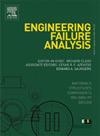Study on the corrosion failure mechanism of X80 pipeline steel by chloride ion at different concentrations
IF 4.4
2区 工程技术
Q1 ENGINEERING, MECHANICAL
引用次数: 0
Abstract
In this study, the stress corrosion cracking (SCC) behavior, electrochemical behavior and crack extension mechanism of X80 pipeline steel under different chloride ion concentrations were investigated. Slow strain rate tensile tests (SSRT), electrochemical tests and corrosion immersion tests were carried out on X80 pipeline steel using NaCl solution with concentrations of 1.75(±0.05) wt%, 3.50(±0.03) wt% and 5.25(±0.05) wt% as the test environment. The results showed that the yield strength of X80 steel decreased from 592 MPa to 560 MPa, the tensile strength from 668 MPa to 640 MPa, and the uniform elongation (UE) and elongation after fracture (EA) decreased from 6.22 % to 5.05 % and 9.2 % to 8.81 %, respectively, with the increase of chloride concentration. At the same time, the corrosion resistance of the steel decreased, the Tafel anode slope decreased by 293 %, the Fe2+ content in the corrosion product film increased, the self-corrosion current density increased, and the charge transfer resistance (Rct) decreased. Under the coordinated action of stress and chloride ions, the corrosion product film is destroyed, the ferrite is deformed, and the ferrite site becomes a source of pitting corrosion. Stress corrosion cracking is increased and extended here.
不同浓度氯离子对X80管线钢腐蚀失效机理的研究
研究了不同氯离子浓度下X80管线钢的应力腐蚀开裂(SCC)行为、电化学行为及裂纹扩展机制。以浓度分别为1.75(±0.05)wt%、3.50(±0.03)wt%和5.25(±0.05)wt%的NaCl溶液为试验环境,对X80管线钢进行了慢应变速率拉伸试验(SSRT)、电化学试验和腐蚀浸泡试验。结果表明,随着氯化物浓度的增加,X80钢的屈服强度从592 MPa下降到560 MPa,抗拉强度从668 MPa下降到640 MPa,均匀伸长率(UE)和断裂伸长率(EA)分别从6.22%下降到5.05%和9.2%下降到8.81%。同时,钢的耐蚀性下降,Tafel阳极斜率下降293%,腐蚀产物膜中Fe2+含量增加,自腐蚀电流密度增加,电荷传递电阻(Rct)降低。在应力和氯离子的协同作用下,腐蚀产物膜被破坏,铁素体变形,铁素体部位成为点蚀的来源。应力腐蚀开裂在这里增加和扩展。
本文章由计算机程序翻译,如有差异,请以英文原文为准。
求助全文
约1分钟内获得全文
求助全文
来源期刊

Engineering Failure Analysis
工程技术-材料科学:表征与测试
CiteScore
7.70
自引率
20.00%
发文量
956
审稿时长
47 days
期刊介绍:
Engineering Failure Analysis publishes research papers describing the analysis of engineering failures and related studies.
Papers relating to the structure, properties and behaviour of engineering materials are encouraged, particularly those which also involve the detailed application of materials parameters to problems in engineering structures, components and design. In addition to the area of materials engineering, the interacting fields of mechanical, manufacturing, aeronautical, civil, chemical, corrosion and design engineering are considered relevant. Activity should be directed at analysing engineering failures and carrying out research to help reduce the incidences of failures and to extend the operating horizons of engineering materials.
Emphasis is placed on the mechanical properties of materials and their behaviour when influenced by structure, process and environment. Metallic, polymeric, ceramic and natural materials are all included and the application of these materials to real engineering situations should be emphasised. The use of a case-study based approach is also encouraged.
Engineering Failure Analysis provides essential reference material and critical feedback into the design process thereby contributing to the prevention of engineering failures in the future. All submissions will be subject to peer review from leading experts in the field.
 求助内容:
求助内容: 应助结果提醒方式:
应助结果提醒方式:


